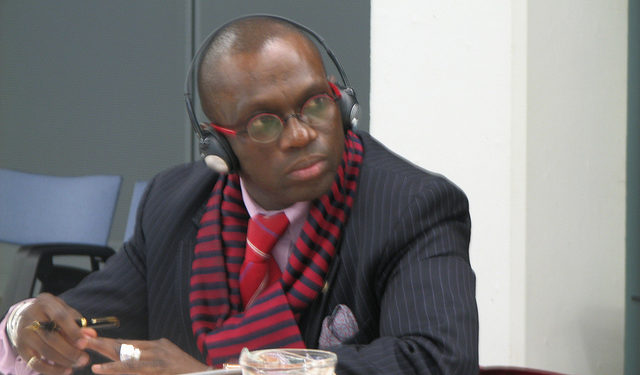Everybody knows what judges, prosecutors and defence lawyers do at the International Criminal Court, but not so a strange beast in the zoo of organs and institutions that make up the ICC called the Office of Public Counsel for Defence.
On Friday, the ICC celebrated the tenth anniversary of the OPCD. Its role is not “self-explanatory”; and it is often mistaken for what it is not — a bar association.
A bar association is institutionally separate from the Court, whilst OPCD staff is empolyed by the Court and paid by the ICC Registry. The OPCD – a unique creation in the realm of international courts when it was set up at the ICC in 2006 – helps and facilitates the work of the various defence teams, as an independent institution, though administratively linked to the ICC Registry.
During the ceremony, defence lawyers praticising before the ICC hailed how the OPCD has been helping their work over the years with legal research and practical advice, enabling them to do their job “more efficiently and more quickly”.
Xavier-Jean Keïta, the principal counsel of the OPCD, reiterated his wish that the office be recognised as a fully-fledged organ of the ICC, like the judges, the prosecution and the registry. Speakers like Karim Khan, defence counsel for Kenyan Deputy President William Ruto, stressed that being an independent, fully-fledged organ within the ICC system might also strengthen the defence position in the annual negotiations about money, which will once again occupy the agenda of the Assembly of the States Parties (ASP) to the Rome Statute, which will hold its 15th session in The Hague from November 16th, and, among other things decide the 2017 budget. The defence is now “the weakest entity in terms of institutional standing”, Khan highlighted, as opposed to the OTP with its direct access to contributing states.
Sir Adrian Fulford (the presiding judge during the first ever ICC trial, in the Lubanga case) and Bruno Cathala (the first ICC Registrar) were hailed as “founding fathers” of the OPCD during the ceremony at the ICC premises. Before joining the ICC, Cathala, a French lawyer, had been deputy registrar of the International Criminal Tribunal for the former Yugoslavia (ICTY), the first international criminal court of modern times, established in 1993, after the post-Second World War tribunals in Nuremberg and Tokyo.
At the ICTY, Cathala could see certain practical circumstances that could jeopardise the principle of “equality of arms”, which is so essential to a fair trial. Suspects could choose a defence lawyer they would trust from their country of origin (Bosnia, Croatia, Serbia, etc.). But arriving at the ICTY in The Hague for the first time, those jurists would be unfamiliar with the procedure and the legal system under which the tribunal operates, which is largely inspired by the common law system developed over the centuries since the Middle Ages in England and the countries she colonised. Yugoslavia, as a country of continental Europe, used the very much different civil law system — “le droit romano-germanique” as people will say in French-speaking countries, the law designed in the Roman Empire 2,000 years ago and then further developed in Germanic countries like Germany.
This culture clash would put the “newly arrived” defence teams at a disadvantage, as opposed to the Office of the Prosecutor that had lots of experienced staff from common law countries (US, UK, Australia etc.) that would know the ICTY system and its jurisprudence very well.
The idea was that an OPCD could help and assist newly arriving defence lawyers by “initiating” them to the ICC system (which, like at the ICTY, is largely inspired by the common law tradition, e.g. with its cross-examinations which don’t exist in civil law). The OPCD would also be the “institutional memory” of the defence as far jurisprudence is concerned, which the Office of the Prosecutor already had “in-house”.
There was another problem specific to international courts, which appeared at the ICTY. Suspects would often opt for a “mixed” defence team: one lawyer from their own country who would know their language and culture and the legal system they were used to, civil law. Next to the “familiar” jurist, they would hire one lawyer from Britain or the USA or another common law country that would be a native speaker of the predominant working language at the ICTY, English, and know common law and its procedures and judicial practices (like cross-examination).
That would lead to “expensive phenomena”, like status conferences for which defence lawyers would come over to The Hague from places like California or New York and that would be done with in 20 minutes. Still, the United Nations would have to pay for plane tickets and hotel bills. The idea was that OPCD staff resident in The Hague anyway (as employed on a full-time basis by the ICC Registry) could sit in for the defence team during short hearings like status conferences that would be merely of a procedural and administrative nature.
As imperfect as the present ICC system might be, progress has been made compared to the early days of modern international criminal justice, which was reaffirmed during the keynote speech of Howard Morrison, QC. The British lawyer, who is currently an ICC judge in the Appeals Chamber, was a defence counsel during the very early days of modern international criminal justice at the ICTY. He recalled that defence lawyers then had no access to the canteen and the library, as they were not trusted, like journalists. Once they got ICTY badges to walk relatively freely in the building, “Defence” would be marked very visibly on them to “warn” other ICTY staff they would encounter in the corridors. Staff of organs like registry or OTP would be inclined to “make the sign of the cross” or “put garlic around their neck” when they would bump into a defence lawyer in the ICTY corridors.







